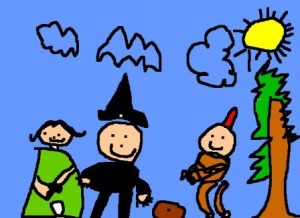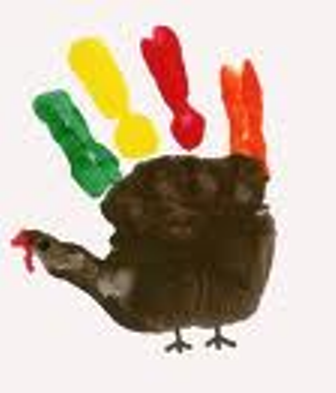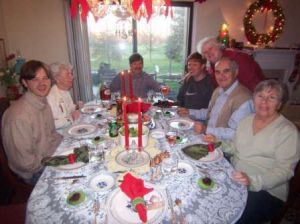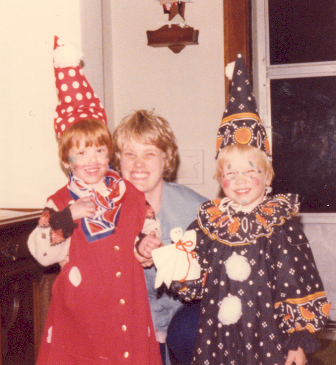by Mary E. Ulrich | Nov 5, 2024

Squanto helps the Pilgrims
Thanksgiving Week: Day 1
I love the story of Thanksgiving. It is a story of inclusion (click here) and interdependence.
A group of pioneer families risk it all and travel to a strange land. They gratefully accept the help of the Native Americans who look different, speak a different language, have different cultural and religious beliefs. At first they are fearful of the differences, eventually they peacefully trade, share and learn from each other. The Native Americans welcome them into this new people and environment. But the Native Americans save the pilgrims from starvation (yea, corn, pumpkins, turkeys…) and disease (yea, the cranberry). Both groups still value their own cultural beliefs and traditions, but as neighbors they become an interdependent community which shares the hard work and sacrifice. Then, after a successful harvest, they do what every culture since the beginning of time does, they are thankful and celebrate.
As an early childhood teacher and special education professional I looked for ways to teach about cooperation, collaboration, and community. I looked for ways to include my students with special needs into the “normalized” (click here) holiday school programs and activities. I looked for ways to differentiate the curriculum so even the students with the most severe disabilities could partially participate.
Inclusion success stories for ALL children:
White Gifts for the Food Bank:
The entire school sponsored a “white gift” program for Thanksgiving. Each child brought in a non-perishable food item for the local food bank. The children decorated and wrapped the gifts in white tissue paper and put them into donated laundry baskets to distribute.
Thanksgiving Day Program:
I paraphrased and adapted the songs and dances so everyone could participate. We used the songs below in both large whole school programs and our individual class programs.
Bringing in the Community:
These were always crowd favorites. We would sing the songs, have someone dress up like a turkey and strut around. (One time it was the principal, one time a favorite music/gym teacher, sometimes a parent or a student from the high school drama club.) The turkey also lead the rhythm band for a couple songs. When we had a music teacher, she taught the rhythm band, after the cutbacks the teacher did it.
Each student made a picture for their families. If they were able, they wrote and read a sentence of what they were thankful for to the group. If the student couldn’t read, write or talk, they had a picture or the actual object they were thankful for (A picture of their family or a grandparent, a flower…) They might use a tape recorder, or ask their friends to say it with them.
For the grand finale, the class would line-dance to the traditional music of Turkey in the Straw and Old Joe Clark (the gym teacher helped teach the dances).
Finally, we ask the parents, brothers – sisters to join in for the Turkey in the Straw square and Old Joe Clark square dance classics.
The students created and colored/painted the programs, created unique tickets if we had limited seating, and they collected the tickets at the door. The words to all the songs were in the program so the children and parents could read and sing them together at home.
Refreshments:
The day before the program we had everyone bring in a piece of fruit for each person who was coming, the class made fruit salad, corn bread and cookies for the refreshments. Extra parents volunteered the day we made the fruit salad, corn bread and cookies. We had about 6 different kinds of fruit and vegetable peelers. We set up “stations” with a parent as supervisor of each station. Everyone participated, or partially participated according to their abilities.
Disabilities were not the issue, it was how can this person participate.
Decorations:
The students decorated the room and bulletin boards. We made several large murals of fruit cornacopeia, or a farm or grocery fruit and vegetable stand, or garden….
During our group story time, we used poster board to plan what we would do, and who would be responsible. We divided up the chores. The children chose how they wanted to do it. We usually combined the farm,Thanksgiving, food and/or autumn thematic units so the bulletin boards and room were decorated at least a week ahead of time. All learning activities focused on the thematic unit, were tied to standardized goals and IEP goals.
Children Giving the Tour:
Before the program, the students gave their parents and guests a tour of the classroom explaining what we were doing, what they were learning.
After the program, the parents got to take all their child’s work home to show grandma and grandpa or other friends on Thanksgiving day.
On Thanksgiving Day
Many families told us the whole family sang the songs and some used the “On Thanksgiving” song as part of the grace at Thanksgiving dinner. It really was a nice way of bringing the families into our program and letting the children be the experts and teach the songs, games to their families.
SONGS:
Ole Mr. Turkey
Who’s that struttin’ round lookin’ mighty perky?
Looks like it might be old Mister Turkey.
Strut Mr. Turkey that’s a fancy way to walk
Strut Mr. Turkey that’s a fancy way to walk.
Gobble, Gobble, Gobble
I’m a mighty fine turkey and I sing a fine song,
GOBBLE GOBBLE GOBBLE, GOBBLE, GOBBLE, GOBBLE
I strut around the barnyard all the day long and my head goes
BOBBLE BOBBLE BOBBLE.
TUNE: FRIERE JACQUES – Round
(In our school program, I took a song the children knew, rewrote the words, and chose one child to be the “conductor” for each part of the round. Another time in a whole school program, three different classes each sang a different part of the round.)
On Thanksgiving, on Thanksgiving
We are glad, we are glad.
For all the special blessings, all the special blessings
That we have, that we have.
(repeat 3 times)
TUNE: Turkey in the Straw
(I paraphrased the words so we could act it out.)
Oh, a turkey is a bird, just as proud as can be.
He struts around with his tail in the breeze.
He makes gobble noises at everyone he sees.
But thanksgiving is coming, and that’s not make-believe!
RUN TURKEY, HIDE TURKEY
Turkey in the straw, turkey in the hay,
Where oh where will the turkey be
When the table is set Thanksgiving Day? (rub tummy)
In Winter
(Transition verse- putting on coats, getting in line….)
In winter when it’s cold and snows
I have to wear a lot of clothes.
If only I were like a bear
I wouldn’t have all this to wear.
Whatever weather she is in,
She grows her coat right on her skin.
Comments:
What are some of your memories? How did the teacher include ALL students, including the students with disabilities in their activities? What were some of the lessons of that first Thanksgiving that apply to building community and celebrating diversity?
Keep Climbing: Onward and Upward
All my best,
Mary
by Mary E. Ulrich | Nov 3, 2024
This article is dedicated to Dr. Lou Brown, from the University of Wisconsin–Madison who died in 2021.
He taught us about “ecological inventories,” “Life space inventories,” “developmental twins,” “Pre- means never,” “functional curriculum” and testified in our court case that anything in the segregated handicapped-only school for people with severe disabilities could be portable and done in a public school. He made all the difference in our lives and helped change special education. He also told us to not let them teach our kids “dumb stuff”.

Aaron 3 yrs. old. Isn’t this cute, I’ll save it forever.
Hand-Print Turkeys
The first time Aaron brought home a hand-print turkey he was 3 years old and I thought it was adorable.
HOWEVER
When Aaron was 25 years old and brought home the same hand-print turkey, I was livid.

Aaron 25 years old. Kill the Turkey!
What’s the difference? Same kid, same activity. Why is one turkey a treasure, another only fit for the garbage?
The difference is the educational and philosophical debate between “developmentally age-appropriate” and “chronologically age-appropriate” activities for people with autism and developmental disabilities.
In a previous post, I introduced Dr. Lou Brown’s ecological assessment tool the “Life Space Analysis” (click here) This planning tool for people with disabilities helps identify the when, where, who and what fills a person’s day and gives clues on a person’s quality of life–though this tool can be useful for all of us.
1970s: The Birth of Special Education
Back in the 70s when IDEA was passed and people with disabilities first got the right to go to public school, everyone was trying to figure out how people with disabilities learned? What were the appropriate activities and curriculum? If you want more information about this time period click here: Parallels in Time II.”
Dr. Lou Brown and his colleagues found adolescents and adults across the country playing with infant toys. The “what” in their Life Space Analysis consisted of meaningless activities repeated every day like coloring, stacking blocks, putting colored rings on tubes, playing with wooden puzzles, and generally keeping Fisher-Price in business. “Pre Means Never” is a short video with the main idea as only Lou can tell it.
The rationale was “these students were eternal children”. It didn’t make any difference what they did. There were no expectations. They had low IQs and were functioning at a preschool or early childhood developmental level. So teachers used materials and activities matching the student’s developmental levels. For example: If a person had an IQ of 50 and a developmental age of 5.2 (6 years and 2 months), then the person with the disability should do activities that matched what a normal 5.2 month old child would do. It didn’t matter if the “child” was actually 19 or 35, or 70 in chronological years.
2010: Adult Services
I have to admit, I thought the idea of developmental age was long dead. Aaron went to public school and had plans for his future as an adult (click here). He had a functional community-based curriculum, he had a transition plan, and he had work experience. Plus, the research in the whole field of special education and adult services, strongly supports the idea of chronologically age-appropriate activities.
So, again: What’s the Problem?
In my recent round of looking at adult daycare for people with disabilities and the elderly, I have been shocked out of my mind to find rooms with Fisher-Price toys. I know the toys are indestructible, but come on. They are NOT AGE-Appropriate! If the toy package says ages 3-6, then if you are over 6 years old, it is not age-appropriate.
Schools vs. Adult Day Care
The difference between best practices in the schools and best practices in adult services is the fact that the staff and teachers are licensed. They have the training and have studied the research literature about best practices. They have done student teaching and got first-hand experiences under mentor teachers.
The people who run and work in the adult day care systems are lovely people who have high school diplomas (or GEDs) and because the job pays little more than minimum wage, they get no in-service, no vision of what CAN happen. They have the reality of too many people with disabilities, not enough help, and no training. So making preschool turkeys, or paper plate pilgrims make sense to them. The materials are cheap and the activity matches their developmental ages.

Thankful?
Being Thankful
I am thankful Aaron has someplace to go during the day. (Some states have nothing and the people sit at home.)
I am thankful these kind people don’t abuse and hurt Aaron.
I am thankful they take him to the bathroom, wipe up his messes, help him eat his lunch, and do their best.
But, they send home a paper plate bunny, toilet paper firecracker, macaroni Santa… And I am not thankful.
I don’t have an answer. I have tried to send in more age-appropriate materials and resources. I have tried to show alternative activities. And they are not thankful.
Comments:
What do you think? Is my age-appropriate rant just silly? What do you think I should do the next time Aaron brings home a preschool craft? Do you think the types of activities make a difference to people with disabilities?
If this makes sense and you want to spread the word, please retweet or link to Facebook. We have a whole lot of people to reach before the Christmas and holiday crafts begin.
I would be thankful.
Keep Climbing: Onward and Upward
All my best,
Mary
Brown, L., Branston, M., Hamre Nietupski, S., Pumpian, I., Certo, N. & Gruenewald, L. (1979). A Strategy for Developing Chronological Age Appropriate and Functional Curricular Content For Severely Handicapped Adolescents and Young Adults. Journal of Special Education, 13(1), 81 – 90.
by Mary E. Ulrich | Nov 1, 2024
Here is one of our most popular posts. Relax and make an individualized ENJOYMENT program for your best holiday ever.
Mary

Easy as I.E.P.
Mom’s I.E.P. for the Holidays: Individualized Enjoyment Program
Want to enjoy the holidays?
Of Course.
Easy as I.E.P.
Don’t laugh. I.E.P.’s were developed because they are good planning tools. Some people are intimidated or challenged by the I.E.P. in Special Education. One way to demystify the I.E.P. process is to use it in our everyday lives. So, stick with me for a minute while we look at how this can work in real life.
Let’s use the Individualized Education Program to create a holiday planning guide.
The first part is to create your Dream Program of what you want. Then we plug in the basic parts of the I.E.P.: Evaluation, Annual Goals, Short term objectives, Related Services, Placement, and circle back to the Evaluation for the next I.E.P. for next year.
Dreaming of YOUR perfect holiday
Everyone’s perfect holiday looks different: Grandma’s turkey feast, or make that a roast goose, or Uncle Bob’s ham and sweet potatoes, or a vegetarian, or Kosher, or vegan, or gluten-free …
Everyone has different expectations, traditions, time and money constraints. So forget the Women’s magazines, forget what your Mother-in-law wants, forget what happens on the Food Channel and Martha Stewart show.
We don’t care about “Everybody.”
The beauty of the I.E.P. is it is individualized. It is for You. Not your mother, your children, your boss…YOU! This is YOUR moment, your freedom, just YOU–what do you want?
Action Step 1: Visualize a Dream Holiday
Take a deep breath and picture a smiling yourself surrounded by your favorite people, doing what you really want to do. Ahhhhh.
Are you skiing down a mountain? Are you sitting by the fireplace listening to Bing Crosby? or Lady Antebellum?…
What would make this a joyous holiday for you–with just the right balance of work and relaxation?
What were the strengths and weaknesses of previous holidays?
Do you want to start any new “You” traditions, new family traditions?
Define your dream program (see related post)
Feel empowered to do it YOUR WAY. This is your holiday gift to yourself. You deserve it!
Don’t you feel better already? This holiday is going to be the best.
Dream Plan:
1. Take a sheet of paper and fold it into four squares: Wants, Needs, Likes, and Dislikes.
2. Fill in the boxes based on YOUR Individualized choices.
If you are feeling pressure because others are trying to get you to do something you don’t want to do, be polite but tell them to make their own IEP. 🙂 Empower yourself! I know this is hard for me and most Moms.
3. Circle your five top priorities and they will become your goals.
For example: Want live tree. Need family to be together for dinner. Loved shopping with Aunt Ruth. Hated the last minute rush….
One Priority goal: Need family to be together for dinner.
Making a decision is the first step. What do YOU want? What would bring YOU joy?
EVALUATION:
Since there is no standardized tool to measure the
holidays–no HFA (Holiday Fun Assessment) or HQ (Happiness Quotient)–we will create an informal evaluation tool based on ecological assessments.
GOALS:
LONG TERM GOAL I: To have a traditional, homemade turkey dinner with family members on Christmas Day.
Do we want to raise the turkey and grow the corn for the stuffing? Serve the strawberry preserves from your summer garden? Do we want to skip the preparation and order in? Or go out to eat? So many choices?
If we decide to keep this as one of our goals, then we must break down our long-term goal into measurable, observable steps.
Mom decides she wants to cook the Christmas dinner and eat at home.
SHORT TERM OBJECTIVES:
“Short-term objectives are merely small steps that enable us to get from where we are now to where we want to be by a certain date.”
A. Mom will finalize the menu by December 10.
B. Mom will make the list and complete the shopping by December 15.
C. Mom will prepare the dinner by December 25.
Each of these short-term objectives can be “task analyzed” and broken down into smaller parts.
We know these are important steps to reaching our goal so they must be completed with 100% accuracy. (75% completion of the meal may leave some family members hungry.)
Goal Two:
LONG TERM GOAL II: To have the gifts wrapped and under the tree by December 24.
SHORT TERM OBJECTIVES:
A. Mom will purchase all supplies by December 10.
B. Mom will supervise the gift-wrapping by December 15.
Task Analysis example:
Mom will supervise:
1. Billy will cut the paper.
2. Dad will wrap and tape the gifts.
3. Susie will add the bow.
4. Tommy will place the presents under the tree.
Notice in the Task Analysis, family members with different skill levels can all partially participate.
RELATED SERVICES:
—“Developmental, corrective, and other supportive services to enable you to reach your goals.”
To achieve Goal IC –“Mom will prepare the food by December 25”—Mom will need the following supportive services:
Consultant: Grandma has the expertise to bake and bring perfect pumpkin pies.
Consultant: Aunt Jane will come early to help in the kitchen.
Community Resource: We will purchase the local bakery’s famous dinner rolls.
PLACEMENT:
Now that we have written our IEP we must determine the least restrictive environment for accomplishing our goals.
We could cook and wrap the presents at Aunt Sara’s and bring
everything home, but to meet Mom’s goals on this particular IEP, her own home is the least restrictive environment.
Remember any IEP can be revised or modified at any time. For instance, if Paula Deen wants to invite my family for a holiday dinner, I would change these goals in one butterfat minute.
Happy Holidays
I hope using the I.E.P. process not only makes it easier to understand but hope it can be a tool for you to have a magical holiday season.
Well, what do you think?
1. Do you better understand the IEP process?
2. Would this process be useful for everyone?
3. Does anyone raise turkeys?
Keep Climbing: Onward and Upward
All my best,
Mary
Other posts you might enjoy:
Celebrating St. Nick and two special sons.
Balancing My child’s needs and my needs
by Mary E. Ulrich | Oct 15, 2024

Aaron age 8 Tommy age 6
Are they adorable, or what?
Aaron and Tommy always loved Halloween. Me too. The holiday is such a great way to build an inclusive community.
There were some segregated, handicap-only Halloween parties for just kids with autism and developmental disabilities, but I wanted Aaron to be part of his community. With a little preparation and a lot of team effort, it worked.
When Aaron was 8 and Tommy 6 years old we lived in a great neighborhood with lots of kids (click here for a related story) and Halloween was something special.
In the picture above, check out Tommy’s hand. He is holding the ghosts we made and handed out for Trick or Treat.
Task Analysis: Tootsie Pop Ghosts
We took a Tootsie Pop, wrapped a white tissue around the round top, tied it with orange yarn, and with a magic marker added two eyes.
Cute, something homemade and the kids loved them.
Partial Participation
One of the most important concepts in special education is the idea of partial participation. If someone can’t do the whole activity, could they at least partially participate and do some smaller part?
For instance: Aaron, Tommy, and I all worked on the Tootsie Pop Ghosts for a couple of evenings before Halloween.
Aaron’s job was to take the tissue out of the box.
In addition, sometimes he would hold the stick of the Tootsie Roll Pop while Tommy added the tissue. My job was to tie the yarn. It was a team effort, an inclusive experience.
We each did a part of the whole project. We each partially participated.
Aaron contributed what he could. He could pull the tissues out of the tissue box independently.
He could hold the stick with assistance, and only for about a short time. Because he was a valued team member he contributed as long as he could.
Tommy, on the other hand, could have pulled out the tissues as well as most of the rest of the tasks. But what made this activity fun was the fact we all worked together. We wanted everyone to play their part.
Tommy had more skills than Aaron and more tasks in the activity. He got to choose when he did them, but they had to be done before Halloween Day. I could have forced him to finish all the eyes in one sitting–but then it would have been working and Mom’s timeline.
Instead, he got to make his own decision and chose to finish them while he watched The Transformers, Electric Company, and Scooby-Doo on TV–his timeline.
He finished up the ghosts by adding the eyes and jamming the stick of the finished ghost into a shoe box lid so the ghosts would “float.” He chose the time, was self-motivated, and had the satisfaction of seeing the job to the end.
We made enough ghosts so both Aaron and Tommy could take them to their classes at school. They were always a big hit and I think they were proud they worked on them.
Team Effort
On Halloween night, Tommy went with all his friends to a crowd of ghosts, clowns, and monsters. He was gone for hours and filled his pillow sack as full as he could. One of the neighborhood mothers kept an eye out for Tommy.
Usually, Aaron and I would go to the immediate neighbors while Dad manned the front door of our house.
One person could not be in three places at once: with Tommy, with Aaron, and at the front door. We really needed our neighbor, our community resource, to help us out.
Tips, Sensory Issues, and Routines
This particular Halloween Aaron learned about doorbells. We went to each house and I would point so Aaron would know where to press and he would just smile as the ding or ring, or buzz sounded. He had a great time. Cause and effect. Press the button–hear a funny sound.
The neighbors were always very kind and generous because they knew Aaron. If I prompted him with, “Aaron what do you say?” he would respond, “Thank you” and give them a smile. It really was a way they could get to know Aaron and we could build our community relationships.
We only went to about 10 houses because of all the excitement, plus maneuvering the steps and the dark was a lot of sensory stuff to handle. But Aaron really seemed to understand and enjoy the routine: Go to the house…climb up the steps…ring the bell…get candy…say thank you…repeat.
It was a fun night.
Over-Generalization
What wasn’t so fun was the next night. See, Aaron learned the routine really, really well. Too well.
So, the next day guess what? I was busy taking the groceries out of the car, when I looked up Aaron had somehow gotten to the house next door, rang the doorbell, and was waiting for some candy.
It took me longer than my neighbor to figure out what was going on. She just smiled, reached in her extras from the night before, and handed Aaron a chocolate bar. I could have hugged her.
Tommy to the Rescue
Tommy thought the whole scene was hysterical. Our whole family laughed about Aaron’s behavior at the dinner table but we knew we had a problem. How were we going to teach Aaron that Halloween only came one day a year? Why was it okay to do something one day–but not the next?
Tommy came up with the solution. He suggested we put away all the Halloween decorations and candy. And sure enough, it worked. Without all the reminders, Aaron moved on to other things.
Full Circle
This Halloween, Tommy will be taking his baby girl Trick or Treating for the first time. And Aaron, he will be passing out Tootsie Pop ghosts when the neighbor kids come to his house.
Trick or Treat? Comments?
Tell us some of your Halloween stories and memories. Stories of partial participation, over-generalization, community building…
Keep Climbing: Onward and Upward
All my best,
Mary






